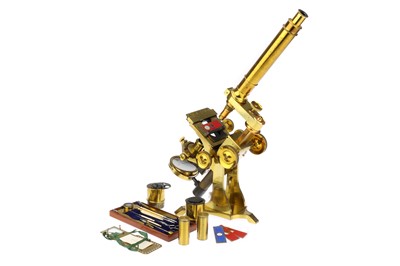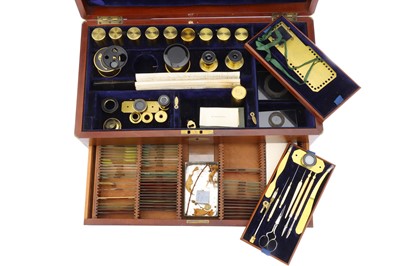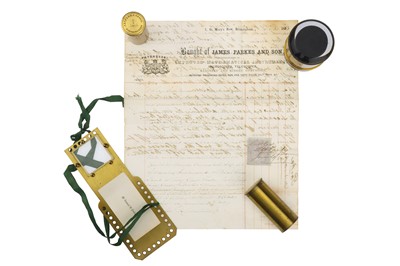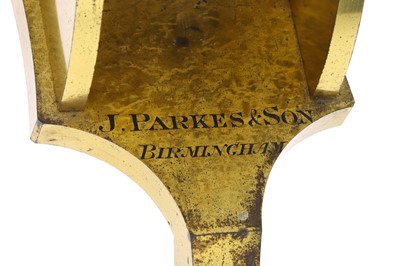24th May, 2023 12:00
Fine Instruments of Science, Medicine and Books
A Large Victorian Binocular Microscope By Parkes, With Provenance
English, dated on the original invoice May 22 1860, signed 'J Parkes & Son, Birmingham' the microscope on a a large 'Y' shaped base with tall uprights supporting the main body on arge trunnions, large diameter plano-concave mirror in gimbal on sliding collar, mechanical substage with X_Y control crown gear and pinion for rotation and rack and pinion focusing, mechanical stage with X-Y control via rack and screw, course focus to rear of bar with screw fine focus on limb to nosepiece, with PreRMS Ross thread to objectives, complete with a large fitted case of accessories and slides with many prepared by the original owner, James Watsom MP, the set contains 6 objectives and cans all signed Parkes, 2 eyepieces, substage accessories, a large frog plate a selection of fine tools and other items, a drawer at the bottom contains the slides, microscope height 55cm, case width 47cm
Provenance: From a sale of items from Berwick House, Shropshire
James Watson was a man of many talents - an English merchant, dairy herdsman, and Conservative politician who served as a Member of Parliament from 1885 to 1892. Born in 1817, Watson lived a long and productive life, making significant contributions to both the economic and political spheres of England during his time.
Watson was born in the small town of Bowes in County Durham, where he spent much of his early life. As a young man, he worked as a farmer and dairy herdsman, honing his skills in animal husbandry and developing a keen eye for business. He eventually moved to London, where he set up a successful wholesale grocery business, importing goods from all over the world and selling them to local merchants and consumers.
In addition to his business pursuits, Watson was deeply involved in politics, particularly in the Conservative Party. In 1885, he was elected to the House of Commons, representing the constituency of Stockton-on-Tees. During his time in Parliament, Watson was a strong advocate for the interests of the working class, particularly those in the agricultural sector. He was a vocal proponent of measures to improve the conditions of farmers and to increase the availability of affordable food for the poor.
One of Watson's most notable achievements as a politician was his work on the Agricultural Holdings Act of 1883. This piece of legislation, which Watson helped to draft and promote, provided important protections and rights for tenant farmers, including the ability to negotiate longer leases and to receive compensation for improvements made to their land. The Act was a significant step forward for the agricultural sector, helping to secure the livelihoods of countless farmers and their families.
Throughout his life, Watson remained committed to his values of hard work, fairness, and service to his community. He was a generous philanthropist, supporting a variety of charitable causes and institutions throughout his lifetime. He was also deeply committed to his family, and was known for his devotion to his wife and children.
James Watson died in 1895, at the age of 78. He left behind a legacy of hard work, dedication, and service to others, both in his business and political pursuits and in his personal life. His contributions to the agricultural sector and to the Conservative Party continue to be felt today, and his example of integrity and commitment to community remains an inspiration to many.
English, dated on the original invoice May 22 1860, signed 'J Parkes & Son, Birmingham' the microscope on a a large 'Y' shaped base with tall uprights supporting the main body on arge trunnions, large diameter plano-concave mirror in gimbal on sliding collar, mechanical substage with X_Y control crown gear and pinion for rotation and rack and pinion focusing, mechanical stage with X-Y control via rack and screw, course focus to rear of bar with screw fine focus on limb to nosepiece, with PreRMS Ross thread to objectives, complete with a large fitted case of accessories and slides with many prepared by the original owner, James Watsom MP, the set contains 6 objectives and cans all signed Parkes, 2 eyepieces, substage accessories, a large frog plate a selection of fine tools and other items, a drawer at the bottom contains the slides, microscope height 55cm, case width 47cm
Provenance: From a sale of items from Berwick House, Shropshire
James Watson was a man of many talents - an English merchant, dairy herdsman, and Conservative politician who served as a Member of Parliament from 1885 to 1892. Born in 1817, Watson lived a long and productive life, making significant contributions to both the economic and political spheres of England during his time.
Watson was born in the small town of Bowes in County Durham, where he spent much of his early life. As a young man, he worked as a farmer and dairy herdsman, honing his skills in animal husbandry and developing a keen eye for business. He eventually moved to London, where he set up a successful wholesale grocery business, importing goods from all over the world and selling them to local merchants and consumers.
In addition to his business pursuits, Watson was deeply involved in politics, particularly in the Conservative Party. In 1885, he was elected to the House of Commons, representing the constituency of Stockton-on-Tees. During his time in Parliament, Watson was a strong advocate for the interests of the working class, particularly those in the agricultural sector. He was a vocal proponent of measures to improve the conditions of farmers and to increase the availability of affordable food for the poor.
One of Watson's most notable achievements as a politician was his work on the Agricultural Holdings Act of 1883. This piece of legislation, which Watson helped to draft and promote, provided important protections and rights for tenant farmers, including the ability to negotiate longer leases and to receive compensation for improvements made to their land. The Act was a significant step forward for the agricultural sector, helping to secure the livelihoods of countless farmers and their families.
Throughout his life, Watson remained committed to his values of hard work, fairness, and service to his community. He was a generous philanthropist, supporting a variety of charitable causes and institutions throughout his lifetime. He was also deeply committed to his family, and was known for his devotion to his wife and children.
James Watson died in 1895, at the age of 78. He left behind a legacy of hard work, dedication, and service to others, both in his business and political pursuits and in his personal life. His contributions to the agricultural sector and to the Conservative Party continue to be felt today, and his example of integrity and commitment to community remains an inspiration to many.




